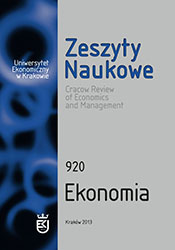Zastosowanie analizy spektralnej do weryfikacji hipotezy o rozłączeniu się gospodarek rozwiniętych i wschodzących
Spectral Analysis-based Verification of the Decoupling Hypothesis between Developed and Emerging Economies
Author(s): Zbigniew Stańczyk, Joanna WyrobekSubject(s): Economy
Published by: Wydawnictwo Uniwersytetu Ekonomicznego w Krakowie
Keywords: business cycles synchronisation; spectral analysis; emerging economies; decoupling hypothesis
Summary/Abstract: The paper discusses the viability of the decoupling hypothesis, which states that the performance of emerging economies becomes relatively independent from the changes in developed economies, and empirically verifies this hypothesis in the light of global economic developments over the past decade. Despite a very influential paper by Kose, Otrok, and Prasad (2008), we argue that there is no evidence that decoupling between developed and emerging economies took place before the last global financial crisis. In fact, the case was quite the contrary ‒ ties between the two groups of countries strengthened during the crisis years. It seems that either decoupling never took place or the recent crisis began a new trend of re-coupling, which is the instance of emerging economies returning to a state of strong dependence on their more developed counterparts. At the same time it raises doubts as to whether the high rates of growth in emerging economies can be sustained in the face of slowing growth in developed economies. In terms of methodology, linear and quadratic de-trending were used to obtain stationary data, then non-cyclical movements were removed with the Christiano-Fitzgerald band--pass filter. The cyclical parts of real GDP time series were then subjected to spectral and co-spectral analysis.
Journal: Zeszyty Naukowe Uniwersytetu Ekonomicznego w Krakowie
- Issue Year: 920/2013
- Issue No: 20
- Page Range: 5-21
- Page Count: 17
- Language: Polish

